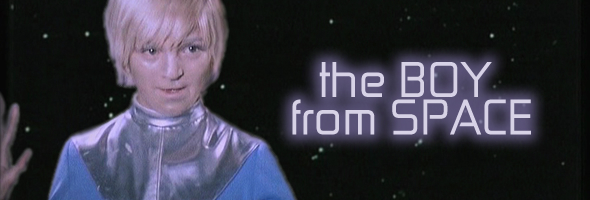
Color, 1971/1980, 200/70m.
Directed by John Prowse
Starring
Sylvestra Le Touzel, Stephen Garlick, Colin Mayes, John Woodnutt, Gabriel Woolf
BFI (DVD) (UK R2 PAL)
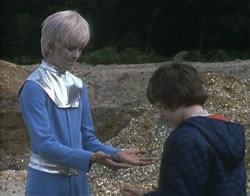 Now here's a really wild one excavated from the BBC vaults making its first-ever debut in any home video format:
Now here's a really wild one excavated from the BBC vaults making its first-ever debut in any home video format: 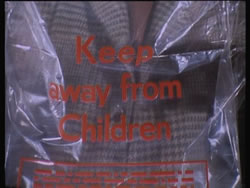 The Boy from Space, a sci-fi series originally produced for the educational series Look and Read in 197. That means you get a glittery, action-packed, and occasionally creepy alien adventure occasionally interrupted by little learning lessons, with the latter portions updated and reshot in 1980 with ubiquitous kid's show presenters Wordy and Cosmo (played by Phil Cheney). That edition is what still survives today, and it's a nutty viewing experience not easily forgotten.
The Boy from Space, a sci-fi series originally produced for the educational series Look and Read in 197. That means you get a glittery, action-packed, and occasionally creepy alien adventure occasionally interrupted by little learning lessons, with the latter portions updated and reshot in 1980 with ubiquitous kid's show presenters Wordy and Cosmo (played by Phil Cheney). That edition is what still survives today, and it's a nutty viewing experience not easily forgotten.
The main storyline here is essentially a variation on the formula later perfected in E.T. with a couple of young siblings, Dan (The Tomorrow People's Garlick) and Helen (Happy-Go-Lucky's Le Touzel), spying an object from space landing nearby while watching the stars. They decide to go hunting for the mystery asteroid and instead find a crashed ship with some highly unusual alien inhabitants. Among them is a platinum-blond boy (Mayes) whose chirpy backwards language inspires them to name him "Peep-peep." Far more menacing is another visitor the children refer to as "the Thin Space Man" (Lifeforce's Woodnutt), an ominous foe who puts the pint-sized heroes in grave danger when they manage to decipher the evil hold he has over their interstellar friend.
Despite the obvious low budget and the inherent limitations of early '70s TV, it's easy to see how this one lodged in the memories of so many young viewers. 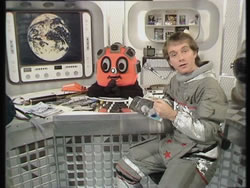 The brief injections of borderline horror involving the Thin Space Man are still fairly jolting, the young actors are pretty good, and the costumes and effects have a homegrown charm that would be impossible to replicate now. Best of all is the striking music by the BBC Radiophonic Workshop's Paddy
The brief injections of borderline horror involving the Thin Space Man are still fairly jolting, the young actors are pretty good, and the costumes and effects have a homegrown charm that would be impossible to replicate now. Best of all is the striking music by the BBC Radiophonic Workshop's Paddy 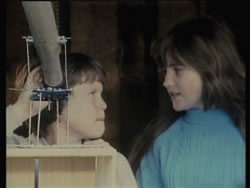 Kingsland, who later went on to score the BBC's The Changes (simultaneously released on DVD with this one as part of the BFI's Sci-Fi: Days of Fear and Wonder celebration in late 2014).
Kingsland, who later went on to score the BBC's The Changes (simultaneously released on DVD with this one as part of the BFI's Sci-Fi: Days of Fear and Wonder celebration in late 2014).
The fact that the 1980 version is the default one here on the first disc makes sense, as this was originally shot in color but only aired in black-and-white in '71 (as that was the standard for most TV sets, especially in schools). That version no longer exists as the master tapes were wiped for reuse, a fate that befell far too many early TV productions. The color revamp (consisting of ten 20-minute episodes including a newly-shot wraparound with the older main actors) can be a bit schizophrenic at times with the new educational inserts (which will probably smack of Mystery Science Theater 3000 for more than a few unfamiliar audiences), but once you get into the groove after an episode or two it all flows together as one big, psychedelic ride.
The main attraction on the second disc is a fascinating alternative, a 70-minute feature version of the main story without all the 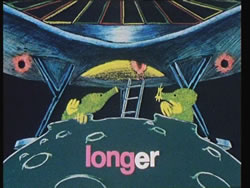 educational detours. The result is basically a straight-up '70s sci-fi film, which may be the preferred option for those who just want to get to the good stuff. Also included are two versions of the 55-minute BBC Records vinyl release, a storybook presentation included in its original audio version (narrated by TV and radio regular Charles Collingwood, the voice of Wordy) and a video version with footage from the show playing out over the same record.
educational detours. The result is basically a straight-up '70s sci-fi film, which may be the preferred option for those who just want to get to the good stuff. Also included are two versions of the 55-minute BBC Records vinyl release, a storybook presentation included in its original audio version (narrated by TV and radio regular Charles Collingwood, the voice of Wordy) and a video version with footage from the show playing out over the same record.
Also included are 19 "Wordy's Think-ups" animated lessons from the series, PDFs of the school brochures for both airings, and an insert booklet with hefty liner notes about the production(s) and television for school in general by Ben Clarke, a rundown of this series' place in the Look and Read canon by Chris Perry, and Kingsland's recollections about composing the 1980 music and songs (replacing the now-lost '71 accompaniment). As the BFI keeps proving with eye-opening packages like this, the once-buried treasures still left to be discovered are apparently boundless.
Reviewed on August 26, 2014.



 Now here's a really wild one excavated from the BBC vaults making its first-ever debut in any home video format:
Now here's a really wild one excavated from the BBC vaults making its first-ever debut in any home video format:  The Boy from Space, a sci-fi series originally produced for the educational series Look and Read in 197. That means you get a glittery, action-packed, and occasionally creepy alien adventure occasionally interrupted by little learning lessons, with the latter portions updated and reshot in 1980 with ubiquitous kid's show presenters Wordy and Cosmo (played by Phil Cheney). That edition is what still survives today, and it's a nutty viewing experience not easily forgotten.
The Boy from Space, a sci-fi series originally produced for the educational series Look and Read in 197. That means you get a glittery, action-packed, and occasionally creepy alien adventure occasionally interrupted by little learning lessons, with the latter portions updated and reshot in 1980 with ubiquitous kid's show presenters Wordy and Cosmo (played by Phil Cheney). That edition is what still survives today, and it's a nutty viewing experience not easily forgotten.  The brief injections of borderline horror involving the Thin Space Man are still fairly jolting, the young actors are pretty good, and the costumes and effects have a homegrown charm that would be impossible to replicate now. Best of all is the striking music by the BBC Radiophonic Workshop's Paddy
The brief injections of borderline horror involving the Thin Space Man are still fairly jolting, the young actors are pretty good, and the costumes and effects have a homegrown charm that would be impossible to replicate now. Best of all is the striking music by the BBC Radiophonic Workshop's Paddy  Kingsland, who later went on to score the BBC's The Changes (simultaneously released on DVD with this one as part of the BFI's Sci-Fi: Days of Fear and Wonder celebration in late 2014).
Kingsland, who later went on to score the BBC's The Changes (simultaneously released on DVD with this one as part of the BFI's Sci-Fi: Days of Fear and Wonder celebration in late 2014).  educational detours. The result is basically a straight-up '70s sci-fi film, which may be the preferred option for those who just want to get to the good stuff. Also included are two versions of the 55-minute BBC Records vinyl release, a storybook presentation included in its original audio version (narrated by TV and radio regular Charles Collingwood, the voice of Wordy) and a video version with footage from the show playing out over the same record.
educational detours. The result is basically a straight-up '70s sci-fi film, which may be the preferred option for those who just want to get to the good stuff. Also included are two versions of the 55-minute BBC Records vinyl release, a storybook presentation included in its original audio version (narrated by TV and radio regular Charles Collingwood, the voice of Wordy) and a video version with footage from the show playing out over the same record. ![]()